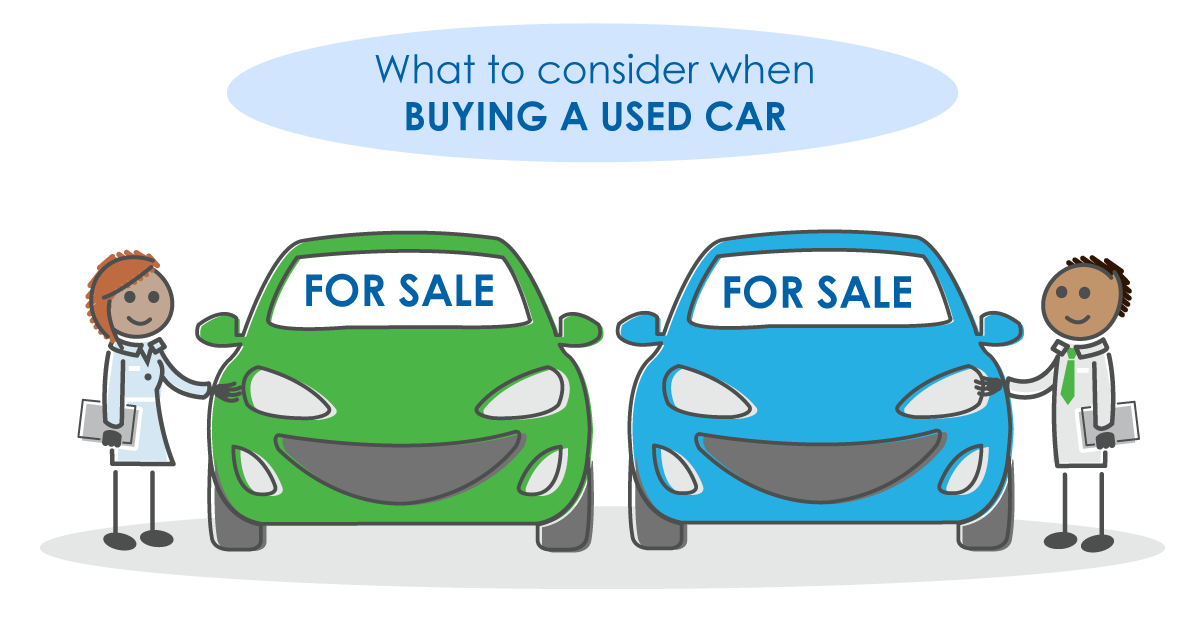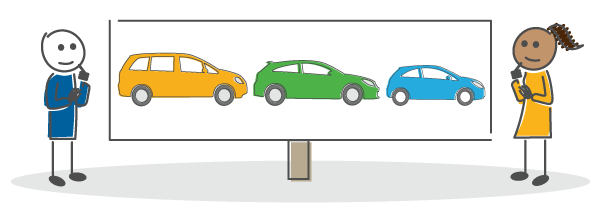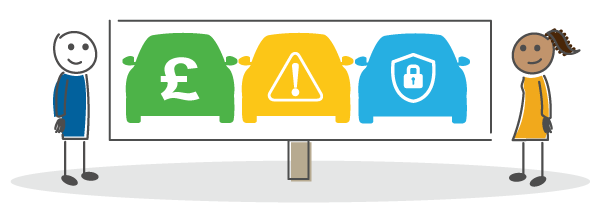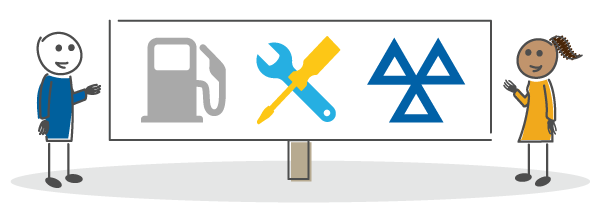
Whether you are buying your first car, replacing an old one or even finally looking to own that dream motor, used car shopping can be an exciting journey in finding your next car. Year on year the used car market continues to be a popular alternative to buying new vehicles and allows buyers to choose from a wide range of second-hand cars to suit their needs.
However, car buying is a big decision and one that should take into consideration a variety of car costs and checks. Shop for used cars with confidence by following our list of key considerations below.
What Car Should You Buy
The very first decision you need to make as a car buyer is what kind of vehicle is going to suit your needs best. Will the car be used to commute many miles on the motorway? Is your family getting bigger and requires more space? Or do you simply need a more efficient and reliable vehicle for daily use?
Whether it’s a sporty coupe, a handy city car or a large SUV, vehicles come in all shapes and sizes, not to mention different fuel, tax and insurance types. This is why deciding on what vehicle you need before car shopping can help you stay focused on what is right for you.

Where To Buy A Used Car
While private car sales and auction markets might provide alternative options for car buyers, here at Go Car Credit, we only provide car finance for vehicles purchased from FCA registered dealerships. This means that you can rely on dealership expertise to not only find you a great vehicle but also benefit from proper checks and inspections before you drive away.
The benefits of buying from an approved dealership also include:
- Reassurance – knowing that you will be purchasing a reliable car
- Guarantees – many dealerships offer warranties and protective coverage with vehicles
- Competitive – working with a dealership may present a great price for a used car
- Part exchange – offering you the opportunity to trade in your old car
- Variety – choose from a variety of different makes and models
- Convenience – You can sometimes drive away the same day
Car History
Once you’ve found a suitable vehicle it’s important to make all the necessary checks before purchasing. Knowing what to look out for when inspecting a used car can mean the difference between a reliable vehicle or considerable costs down the line.
However visual checks alone don’t always highlight past problems that might impact you as the new owner. This is where a car history check such as an HPI check becomes useful as it can highlight information about a car that might be hidden. For example, not only can HPI checks look at MOT history and accurate car mileage, but they can also include information around insurance write-offs, any outstanding finance agreements and much more.
At this stage of the buyer’s journey, one of the most useful pieces of HPI information is an accurate market valuation as well as an overview of the total cost of ownership on a car such as tax, servicing, fuel and more.

Car Insurance Costs
Before buying any car you should always check insurance costs in advance as doing so may highlight a car is more expensive than originally planned.
One of the first things to consider about car insurance is that every vehicle in the UK is categorised into 1 of 50 insurance groups. These groups determine how insurance providers price up car insurance and are calculated using a variety of points including:
- The value of a car when new
- The costs and availability of vehicle parts
- The overall safety and performance of a car
- How secure a vehicle is
It’s also worth noting that the driver can also have an impact on car insurance premiums, particularly with younger drivers who have seen prices increase in recent years.
Use price-comparison sites when buying car insurance as this will help you to find the best possible deal available – while still getting the level of insurance cover that you need.
Car (Road) Tax
Similar to car insurance, road tax can be split into different bands that are based on the amount of CO2 emission produced by a vehicle. The more emissions produced by a vehicle, the higher the car tax will be. This cost will be different for petrol and diesel car owners and can be easily calculated using the online GOV.UK calculator before buying a car.
As well as this, registered car owners have a legal obligation to ensure road tax is up to date and paid on time, regardless of whether the vehicle is actually used. Failure to tax a vehicle that is later driven can result in penalties and fines.
When it comes to paying for your car tax there are a few options, all of which are carried out via the GOV.UK portal. These options allow drivers to make payments at different frequencies. For example:
- Yearly (No Surcharge)
- Every 6 months (5% Surcharge)
- Each month (5% Surcharge)
Buying a used car that has improved fuel efficiency may result in lower overall emissions and therefore a lower road tax band.

Fuel
Constant fluctuations in fuel prices mean drivers are faced with regular worries around the affordability of fueling a car. However, there are a number of ways in which to offset these and get the most out of driving.
Consumption – Consider the fuel consumption of any car you are looking to buy. The bigger the engine, the more fuel it will use in general
Careful driving – Being a little more gentle in accelerating and not driving quite as fast can reduce the amount of fuel you use significantly
Heavy items – Do not leave heavy things in the car if you don’t need them to be there, and take off roof racks if you are not using them. The heavier the car, the more fuel it will use
Shopping around – supermarkets often have very competitive fuel prices, and you can sometimes build up reward points to spend on other shopping
Use this helpful link to find the lowest UK petrol prices in your area www.petrolprices.com
You can save a surprising amount of money by changing the way you drive. An AA test found that the average driver could go 10% further on a tank of fuel by changing a few habits, and the best drivers could go 33% further.
The Annual MOT
All vehicles on UK roads are required by law to have a valid MOT certificate that ensures a car is safe to drive. Vehicle MOTs are a yearly check designed to inspect a complex set of components within a car such as tyres, brakes, exhaust and more. While the cost of an MOT test is typically very reasonable, repairs and replacements could cost a significant amount if a car has not been well maintained.
While car MOT costs can vary greatly, the best way to keep these down is to choose a vehicle that is reliable and in good condition.
Consider the age and mileage of a vehicle before purchasing as older cars with more miles often pose a greater risk of MOT failure. It’s also worth noting that premium vehicles may be affordable to buy initially but their internal components may still be expensive to maintain.
As an added safety net for buyers, always check a vehicle’s MOT history as there may be underlying problems that you as the new owner may have to deal with.
Servicing
Another running cost to consider is regular car servicing. Whilst vehicle servicing is not a legal requirement, opting in for regular maintenance checks will ensure a vehicle is kept safe, reliable and retains its overall value.
Three options are available when it comes to the frequency of this car check which can include major servicing (typically every 24 months), full servicing (carried out yearly) and interim servicing (carried out every 6 months).
During a vehicle service, qualified engineers will check a wide variety of car components, many of which can be easily replaced and may even be included within the cost. However, depending on the vehicle, fuel type and age, these checks may differ and result in varying costs.
Consider booking a service and MOT check at the same time as this can help reduce the costs of visiting a garage multiple times.
Regardless of the age of a car, regular servicing will mean potential problems can be diagnosed early and prolong the overall lifespan.
Depreciation
Simply put, depreciation refers to the amount of value a vehicle can lose over time and is a hugely underappreciated cost for many drivers. While mainly newer cars are impacted heavily by depreciation, all vehicles suffer a loss in value over time, starting from the moment they leave a dealer’s forecourt.
Vehicle depreciation affects cars in a number of ways and will vary depending on the make and model, fuel type and age. However, a factor that drivers can control is the general condition of a car as well as consistent service history.
Other factors that can contribute to vehicle depreciation include:
- The value of the car when new
- Fuel efficiency
- Vehicle mileage
- Safety ratings
- Car colour and modifications
- Desirability
- MOT history
Taking into account a vehicle’s depreciation is an important step, particularly when buying and selling used cars as this can highlight the current accurate market valuation. As well as this, there are services that can help identify other similar makes and models that may depreciate faster over time, giving you more insight into the desired vehicle.”
Additional Vehicle Cover
Alongside the legal car policies and certificates, there are a number of additional coverage options for buyers available which can ensure your new car is protected for longer. While some additional policies depend on what car dealerships and insurance providers offer, it’s worth looking out for the ones most beneficial to you.
Vehicle Warranty
Vehicle warranty offers buyers an extra level of cover should a car require repairs in the short term. Simply put, a car warranty can cover the cost of parts and labour during an agreed amount of time and is available via dealerships and independent providers.
Be aware that warranty options and cover lengths can differ and might not always be available for the vehicle you choose.
Breakdown Cover
Like vehicle warranty, breakdown cover can include a variety of coverage policies and is intended to offer roadside assistance should a vehicle break down.
Many UK breakdown specialists typically offer UK coverage meaning they can attend and even retrieve your vehicle wherever you are. Although breakdown cover is not a legal requirement, it is highly advised all drivers have a policy as the costs of retrieving and repairing a vehicle can be expensive.
Policies are often available for specific car coverage or alternatively any car that the policyholder drives. As well as this, additional policy extras can include alternative transport while your car is in the garage, key and tyre replacement, and even coverage outside of the UK.
Be sure to check your breakdown policy terms and conditions before setting off.



